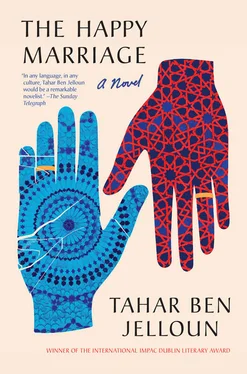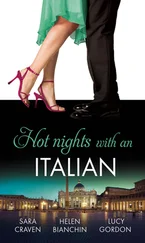His stroke had provided him with the opportunity to reconsider everything in his life. He was completely convinced of that. Not just his married life, but also his relationship to work and the act of creating. “I would love to paint a scream like Bacon did,” he said to himself, “or even fear, that certain something that makes my blood freeze or makes me vulnerable. To paint fear so accurately that I would be able to touch it, as well as render it useless, rub it out, and banish it from my life. I believe in the magic that comes out of painting and acts on reality. Oh yes, as soon as I can move my hands and fingers, I will unleash my attack on fear, a fear that is as horizontal as railroad tracks, an amorphous fear that constantly changes its colors and its appearance, a fear that will extinguish all lights. Indeed, I will catch that fear and lay it out in front of a sea whose blueness will spill over the whole canvas. I will gaze at it in the same way that I think about death. Death no longer frightens me now. But I must be especially careful not to get caught up in my style. I’ll have to create a new rhythm, a music that will repel fear!”
He eyed his lifeless leg and laughed softly. One evening, when he’d been meditating on his fate, he had convinced himself that his paralyzed leg had become the sanctuary of his soul, and that this was where his liberation would begin. The soul is alive and cannot put up with what is stiff and motionless. He was happy to think that his soul had lodged itself in his leg and was working on restoring his ability to move. Sure, it was a bit of a crazy idea, but his belief in it was unshakeable. Since he could no longer paint, he spent his time dreaming and reinventing life. He liked to tell himself that he was living in a little hut from which he could watch the world go by without being seen. Nevertheless, his pain, which was still raw, and his difficult physical therapy exercises had quickly pulled him out of that sickly child’s universe.
One day, when he’d gone back to the clinic for a checkup, he received a phone call. One of the Twins had given him the handset and told him: “It’s Madame Kiara!” which he’d accompanied with an incomprehensible gesture. He’d immediately recognized her voice and was stunned that she hadn’t forgotten him. She had asked him for news, but had quickly realized that he still found it difficult to talk. She told him that Ricardo was doing spectacularly better. They had spent some time in Italy, but had soon been able to travel to set up a new life in the United States, where Ricardo’s physical therapy had completely changed him. His agent had taken care of everything. Ricardo could now move his fingers and when they sat him in front of the piano, he could still play, albeit slightly off-key, just like Glenn Gould, who interpreted Bach in his own inimitable way. His agent had immediately decided to exploit this new angle to Ricardo’s style. “Producers always have their heads screwed on,” she’d added, “but what we really care about is for Ricardo to regain the full use of his reflexes.”
The painter had been pleased to receive news of his old roommate. He told himself that hope could be found on the other side of pain.
Once he’d returned home after his checkup, he had amused himself by imagining how rumors of his stroke had spread and what they must be saying behind his back: “You didn’t know he’d had a stroke? Poor guy, he can’t even paint anymore … now is the perfect time to buy his canvases!” Or even: “He was arrogant and selfish and now God has given him a sign: it’s a warning, the next time will be his last!” Or even more cruelly: “He’s completely fucked now, he won’t even be able to get an erection, a tragedy for someone who loved women the way he did!.. As for his wife, that poor lady he treated so badly, she can at least rest assured now that his willy isn’t good for anything apart from pissing! There’s a poetic justice to that, isn’t there?” “The great seducer will now become acquainted with our solitude. I must admit we were jealous of his conquests, and after all that, his paintings even sold well!” He tried to picture what his art dealer would have said to the buyers: “Whatever you do, don’t sell, wait a few months!” And what about his wife, what had she been up to ever since she’d learned the news? Would she not try to exact her revenge? No, no, he’d promised himself he wouldn’t ask those kinds of questions. He didn’t want to fight with her, he wanted peace, so that he could heal.
Whenever you’re struck by misfortune, either through an illness or an accident, the people around you suddenly change. There are those who scurry off the sinking ship, like rats, those who wait to see how the situation develops before making their next move, and finally those who remain loyal to their feelings and whose behavior doesn’t change. Those friends are both rare and precious.
He was surrounded by people who belonged to each of the three categories. He’d never deluded himself about this particular fact. Before taking up painting, he had devoted himself to studying philosophy. He had especially loved Schopenhauer and his aphorisms; those cutting remarks of his had made him laugh, and they had also taught him to never trust in appearances and to watch out for their traps. For a while, he had even resisted studying philosophy, because he had believed that painting and reading Nietzsche and Schopenhauer were irreconcilable. But he knew how to handle pencils and brushes better than anyone he knew, and his art teacher had strongly encouraged him to study at the École des Beaux-Arts in Paris. Those encouragements had helped him put his dreams of being a philosopher to the side.
And so one fine day he’d left Morocco for Paris. He hadn’t even been twenty years old at the time. In his mind, Paris had stood for freedom, boldness, and intellectual and artistic adventures. This was the city where Picasso had risen to fame and glory, and he had first discovered his vocation when admiring the master’s early canvases, especially those where the fifteen-year-old Picasso had painted his mother on her deathbed. Picasso had left a profound impression on him, and he had wanted to follow in his footsteps. He perfected his style at the École des Beaux-Arts and found his own voice. He had distanced himself from the great names to forge a unique style of his own, a kind of hyper-realism that would eventually become his signature. His canvases, which were rigorously precise, were the fruit of long, painstaking work. He could not create art in any other way. He’d never been able to understand how his contemporaries could splash a bucket of paint onto a canvas or doodle a few lines. He thought their hands were guided by what came easiest to them, and that was exactly what he hated the most. He detested anything that came too easily, without any effort or imagination. He had wanted his painting to be like his philosophy (which he’d nevertheless abandoned): a precisely built edifice that left no room for vagueness, generalities, clichés or approximations. This had been the foundation on which he’d erected his life. As far as he was concerned, it was about being demanding. He took special care over the projects he worked on just as much as he took care of himself. Even the state of his health had become a constant concern, not because he was a hypochondriac, but because he’d seen people close to him die simply out of negligence, or because they hadn’t taken their doctors’ recommendations to heart.
In his present state, his conscience — which dictated that everything be achieved to the highest standards — had stopped mattering as much as it once had. What was perfection good for if he couldn’t even grip a brush between his fingers? On some days, when he felt less overwhelmed and more optimistic, he wouldn’t give in to his usual despair of ever creating anything new again. He would remember Matisse and Renoir, both of whom had continued to paint well into their old age despite their physical afflictions. After all, he had avoided the worst. Hadn’t his friend Gharbaoui died of cold and solitude on a park bench in Paris at the age of forty? And hadn’t Cherkaoui, another painter he admired, died of peritonitis at the age of thirty-three after fleeing France right after the Six-Day War had broken out?
Читать дальше












